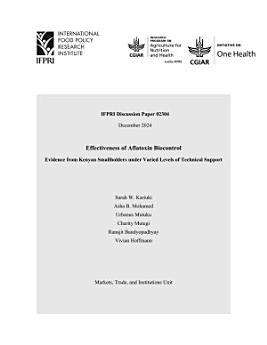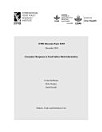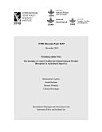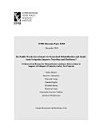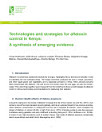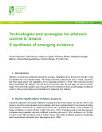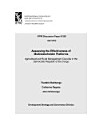Effectiveness of aflatoxin biocontrol: Evidence from Kenyan smallholders under varied levels of technical support
Kariuki, Sarah W. · Mohamed, Asha B. · Mutuku, Urbanus · Mutegi, Charity · Bandyopadhyay, Ranajit · Hoffmann, Vivian
yan 2025 · IFPRI Discussion Papers Kitab 2304 · Intl Food Policy Res Inst
E-kitab
37
Səhifələr
family_home
Uyğundur
info
reportReytinqlər və rəylər doğrulanmır Ətraflı Məlumat
Bu e-kitab haqqında
Agricultural technologies shown to be highly effective in research trials often have a lower impact when utilized by smallholder farmers. Both heterogeneous returns and suboptimal application are believed to play a role in this efficacy gap. We provide experimental evidence on the impact of a biocontrol product for the control of aflatoxin, a carcinogenic fungal byproduct, as applied by smallholder farmers in Kenya. By varying the level of external support across farmers, we investigate the role of misapplication in the effectiveness gap. We find that the provision of biocontrol together with a one-time training on application reduces aflatoxin contamination in maize relative to a control group by 34 percent. Additional training to the farmers in the form of a call to remind them of the correct time of application in the crop cycle increases the reduction to 52 percent. Our findings indicate that farmers can achieve meaningful improvements in food safety using biocontrol even with minimal training on its use and that additional support at the recommended time of application can strengthen its impact.
Bu e-kitabı qiymətləndirin
Fikirlərinizi bizə deyin
Məlumat oxunur
Smartfonlar və planşetlər
Android və iPad/iPhone üçün Google Play Kitablar tətbiqini quraşdırın. Bu hesabınızla avtomatik sinxronlaşır və harada olmağınızdan asılı olmayaraq onlayn və oflayn rejimdə oxumanıza imkan yaradır.
Noutbuklar və kompüterlər
Kompüterinizin veb brauzerini istifadə etməklə Google Play'də alınmış audio kitabları dinləyə bilərsiniz.
eReader'lər və digər cihazlar
Kobo eReaders kimi e-mürəkkəb cihazlarında oxumaq üçün faylı endirməli və onu cihazınıza köçürməlisiniz. Faylları dəstəklənən eReader'lərə köçürmək üçün ətraflı Yardım Mərkəzi təlimatlarını izləyin.
